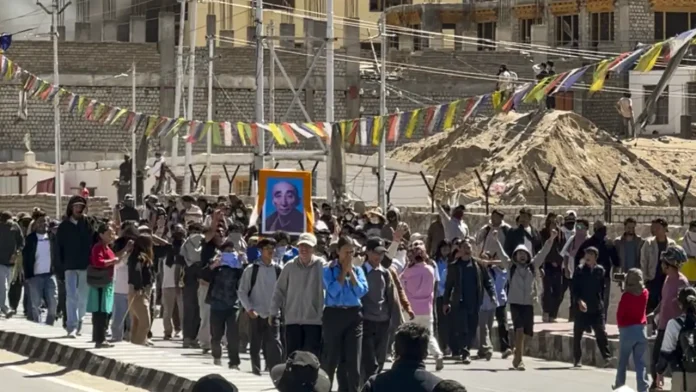Leh, September 25: A statehood agitation in Ladakh spiraled into violence on Wednesday, leaving four people dead and at least 45 injured, including 22 police personnel, in one of the worst incidents of unrest in the region in recent years.
The protest, spearheaded by the youth wing of the Ladakh Apex Body (LAB), saw widespread clashes, arson, and vandalism. The BJP office in Leh and several vehicles were set ablaze as hundreds of demonstrators poured onto the streets during a complete shutdown in the city. Police responded with teargas shelling and firing after mobs turned violent, officials said.
Authorities swiftly imposed prohibitory orders under Section 163 of the BNSS to curb further escalation. Meanwhile, Congress councillor Phuntsog Stanzin Tsepag was booked for allegedly delivering a provocative speech at a hunger strike venue a day earlier.
The protests were triggered after two elderly hunger strikers, Tsering Angchuk (72) and Tashi Dolma (60), were hospitalized on Tuesday following 15 days of fasting. Their health scare, activists said, became the flashpoint for the unrest.
Climate activist Sonam Wangchuk, who had been on a two-week-long hunger strike in support of the movement, announced he was ending his fast in light of the violence. “This is the saddest day for Ladakh and for myself personally. Our struggle has always been peaceful, but today we witnessed violence and arson. I appeal to the youth to stop immediately,” Wangchuk said in an online address, urging the government to resume dialogue with sensitivity.
The agitation revolves around a four-point charter of demands: statehood for Ladakh, inclusion under the Sixth Schedule of the Constitution, separate Lok Sabha seats for Leh and Kargil, and job reservations for locals. Protesters argue that the Centre has failed to deliver on promises made since Ladakh was carved into a Union Territory in 2019.
Wangchuk stressed that frustration among youth, especially over unemployment and the lack of democratic institutions, was fueling unrest. He reminded the government that the Sixth Schedule, currently applicable in parts of the Northeast, offers safeguards for tribal communities through autonomous councils, judicial mechanisms, and financial powers.
A new round of talks between Ladakh’s representatives—including LAB and the Kargil Democratic Alliance (KDA)—and the Union Ministry of Home Affairs is scheduled for October 6.

